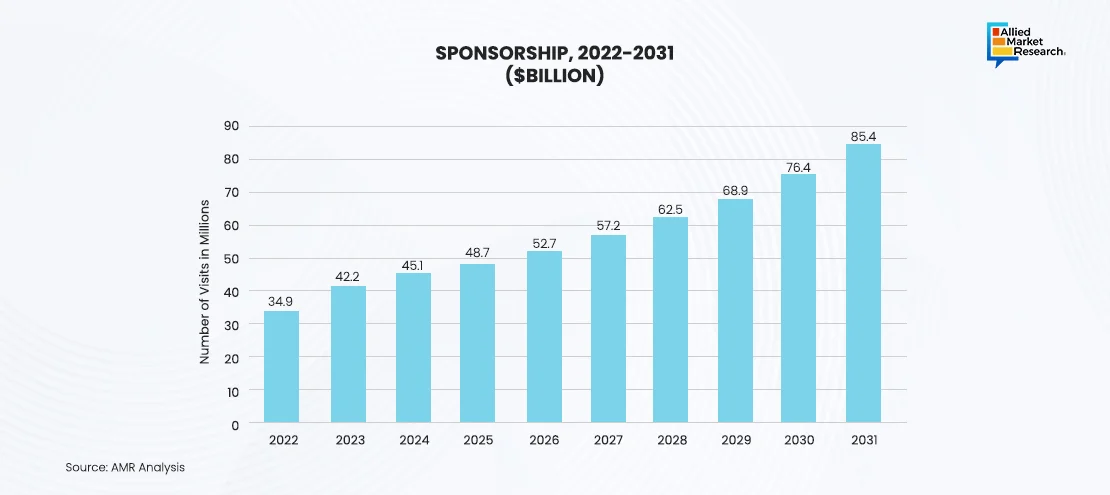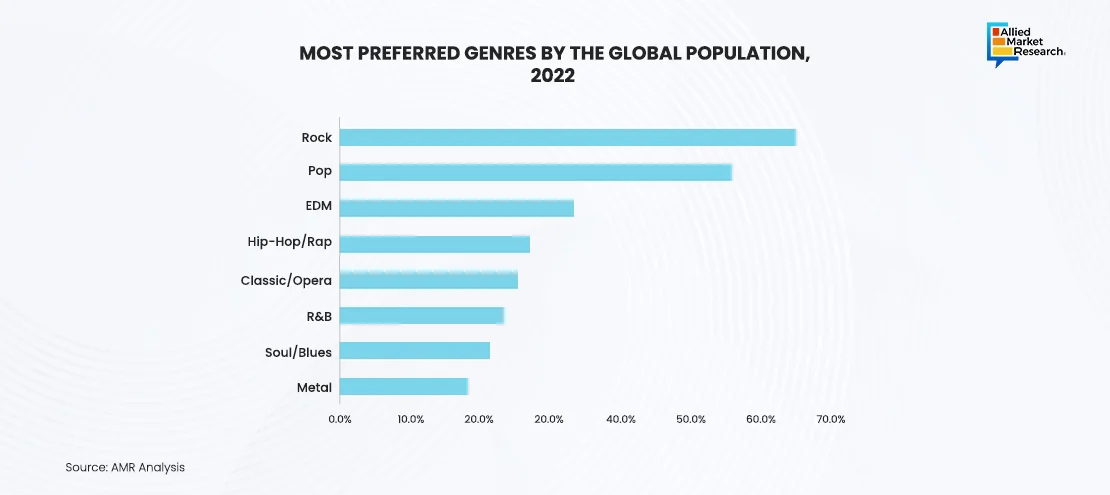Table Of Contents

Roshan Deshmukh

Koyel Ghosh
Transforming Music: Live Performances, Festivals, and Event Management

Music events are evolving rapidly, blending live performances, festivals, and innovative event management to create unforgettable experiences for audiences. From intimate gigs to massive festivals, the music events are adopting technology and creativity, reshaping how audiences engage with artists. Event organizers are utilizing digital platforms, immersive technologies, and meticulous planning to enhance the concert experience, ensuring smooth execution and enhanced audience satisfaction. Alongside, music events generate significant revenue for organizers and local businesses, create numerous job opportunities, and boost tourism, which has contributed to substantial market growth in recent years. This has caused the music event industry to grow from $209.0 billion in 2022 to $481.4 billion by 2031 at a CAGR of over 9.7%.
The Role of Sponsorship in the Music Industry
Sponsorship plays a crucial role in music events, as it provides essential financial support and perks up the visibility of events and artists. By partnering with brands, musicians and event organizers secures funding for production costs, marketing, and logistics, which allows for more ambitious and high-quality performances. In return, sponsors gain access to a targeted and engaged audience, boosting their brand recognition and loyalty. Sponsorship deals often include exclusive content, co-branded merchandise, and unique fan experiences, which helps create a mutually beneficial relationship between the music event organizers and corporate partners.
Recent instances of impactful sponsorships include American Express's ongoing support of major festivals such as Coachella, offering cardholders exclusive perks and pre-sale access. Another instance is the partnership between Red Bull and the Red Bull Music Festival, which not only funds the event but also integrates the brand's identity through curated performances and experiences. Pepsi's ongoing sponsorship of the Super Bowl Halftime Show has lifted the event to new heights, attracting top-tier performers and millions of viewers.

Similarly, Budweiser's collaboration with festivals such as Tomorrowland and Lollapalooza has enhanced the music festival experience with branded stages and interactive installations. Moreover, global brands such as American Express and Nike have sponsored tours for artists such as Beyonce and Billie Eilish, ensuring their tours reach a broad audience while aligning the brands with influential music icons. Furthermore, Spotify's sponsorship of live sessions and intimate concerts highlights how brands are aligning themselves with the live music scene to create deeper connections with audiences.
The Impact of Technology and Sustainability on Festivals and Concerts
Live music events have experienced a significant transformation in recent years, largely driven by technological advancements and shifting audience preferences. The integration of virtual and augmented reality technologies is one of the prominent trends in live music festivals, which offers immersive experiences that complement traditional live performances. For instance, at Coachella 2023, attendees could use AR-enabled smartphone apps to view interactive digital art installations overlaid on the physical festival grounds, enhancing their exploration of the event space. Artists are increasingly taking advantage of these technologies to engage with fans, providing unique and memorable experiences both in-person and online during live music performances. In addition, there has been a rise in hybrid events, which combine live audiences with virtual streaming, expanding the reach of concerts and festivals to global audiences. Sustainability has also become a critical focus, with many organizers adopting eco-friendly practices, such as reducing plastic waste, promoting public transportation, and utilizing renewable energy sources for event production.
In the future, live music events are expected to be driven by ongoing technological advancements and a stronger focus on personalization. Data analytics and artificial intelligence are projected to play an important role in understanding audience preferences and tailoring experiences to individual tastes. Festivals such as Tomorrowland have begun using AI-powered recommendation systems that analyze attendees' music preferences and real-time behavior to suggest personalized schedules, including lesser-known artists that match their tastes, enhancing discovery and overall satisfaction. Moreover, there is a rise in trend toward intimate and exclusive events, where fans can enjoy more direct interaction with their favorite artists in smaller, unique venues. To thrive in the rapidly growing and competitive industry, music event planning companies should begin incorporating technological innovations in the coming years.
Technological Innovations Transforming the Landscape
One significant development is the incorporation of advanced technology to enhance the audience experience. High-definition visual displays, immersive sound systems, and augmented reality are used extensively, creating multisensory experiences that were previously not that common. For instance, Coldplay’s Music of the Spheres tour stood out for its innovative use of AR, providing fans with interactive experiences. Venues have also become more adaptable, with modular designs that allow for quick reconfigurations to suit different types of performances and audience sizes. Harry Styles’ Love on Tour highlighted the flexibility of modern venues, adapting seamlessly to various configurations.

Moreover, sustainability has become a focal point, with many venues adopting eco-friendly practices such as solar power and waste reduction initiatives to minimize their environmental footprint. For instance, Billie Eilish's concert series was praised for its commitment to sustainability, including the use of recycled materials for stage setups. Recent music events have showcased these advancements in spectacular fashion. Beyonce’s Renaissance World Tour featured cutting-edge stage designs and stunning visual effects, while The Weeknd’s After Hours Til Dawn Tour fascinated audiences with its sophisticated light shows and immersive soundscapes, setting a new standard for live music experiences. These developments collectively mark a significant evolution in how music events are created and executed, enhancing the overall experience for both artists and fans around the globe.

Analysis of most popular genres
This graph represents the popularity and preferences for different genres among the global consumers of music events in 2022.
Based on the AMR analysis, rock music emerges as the dominant genre in 2022, preferred by 65% of the population. Pop follows closely at 56%, which indicates a strong preference for mainstream music styles. Electronic dance music (EDM) secures the third position with 33% popularity, that reflects the growing influence of digital music production. Hip-hop/rap, at 27%, shows significant global appeal for the genre. Classical music and opera maintain a notable presence with 25% preference. R&B, soul/blues, and metal round out the list, each gaining between 18-23% of global preference. The distribution suggests a diverse musical landscape, with traditional genres such as rock and pop maintaining their stronghold while newer forms such as EDM and hip-hop have established significant global followings. The data indicates a broad spectrum of musical tastes across the world population, thus helping understand the music event planning companies to invest accordingly.
Case Study: Coachella 2023: Redefining the Festival Experience in a Post-Pandemic World
Introduction
The Coachella Valley Music and Arts Festival returned successfully in 2023, reaffirming its place as a key event in the global music scene. Following the successful relaunch in 2022 after a two-year pandemic-induced hiatus, the 2023 edition aimed to push boundaries and set new standards for large-scale music events. Held over two weekends in April in Indio, California, Coachella 2023 faced the challenge of not just maintaining its iconic status but elevating the festival experience in a world forever changed by recent global events.
Objectives and Implementation
The primary objective of Coachella 2023 was to create an immersive, innovative festival experience that seamlessly blended music, art, and technology while prioritizing sustainability and inclusivity. Organizers implemented a multi-faceted approach to achieve this goal. They curated a diverse lineup that spanned genres and generations, featuring headliners Bad Bunny, BLACKPINK, and Frank Ocean, alongside a mix of established and emerging artists. The festival expanded its art installations, collaborating with international artists to create interactive and visually stunning pieces that complemented the musical performances.
To enhance accessibility and global reach, Coachella 2023 further developed its virtual presence. The organizers partnered with tech companies to offer high-quality livestreams and virtual reality experiences, which allowed fans worldwide to participate in the festival remotely. The organizers also introduced a mobile app with advanced features, including personalized schedules, real-time updates, and augmented reality elements to guide attendees through the festival grounds.
Furthermore, the festival prioritized sustainability by implementing extensive recycling programs, using renewable energy to power stages, and partnering with eco-friendly brands to reduce its carbon footprint. The organizers also emphasized local community engagement, working closely with Indio businesses and residents to ensure the festival positively impacted the region.
Challenges
Despite careful planning, Coachella 2023 faced many challenges. Achieving record attendance while ensuring a safe and enjoyable experience for everyone was difficult. The integration of cutting-edge technology, while enhancing the experience for many, also raised concerns about digital accessibility and the potential for technical glitches.
The festival had to navigate the ongoing global economic uncertainties, which affected everything from ticket pricing strategies to vendor participation. In addition, last-minute changes to the lineup, including Frank Ocean's withdrawal from the second weekend due to an injury, tested the organizers' ability to adapt quickly while maintaining the festival's high standards.
Outcomes
Coachella 2023 was a big success that attracted over 250,000 attendees across both weekends and millions more through virtual platforms. The festival's economic impact on the Coachella Valley region was significant, with local businesses reporting a substantial boost in revenue. The innovative use of technology, particularly virtual reality components, received widespread praise and opened new avenues for future music events. Furthermore, the commitment of the festival to sustainability resulted in a measurable reduction in waste and energy consumption compared to previous years. Social media buzz around the event reached unprecedented levels, with Coachella-related content generating billions of impressions across various platforms.
Future prospects
In the coming years, Coachella is expected to continue its role as a trend setter in the music festival industry. Plans are underway to further expand the virtual festival experience, potentially offering year-round content and experiences linked to the Coachella brand. The organizers are exploring partnerships with tech companies to develop more immersive augmented reality experiences and investigating the potential of hosting simultaneous events in multiple locations worldwide. Moreover, sustainability efforts are set to strengthen, with ambitious goals to make Coachella a carbon-neutral event within the next five years. There is also a growing focus on using the festival as a platform for social causes, with plans to integrate more educational and activist elements into future editions.
Strategic insights
Coachella 2023 demonstrated that the future of music festivals lies in creating multifaceted experiences that extend beyond traditional boundaries. The successful integration of technology enhanced the on-site experience and significantly expanded the festival's global reach and revenue potential. The emphasis on sustainability and community engagement proved that large-scale events can be both profitable and socially responsible. In addition, the challenges faced and overcome highlighted the importance of flexibility and robust contingency planning in event management. The ability of Coachella 2023 to quickly adapt to last-minute changes while maintaining quality highlighted the value of strong partnerships and a skilled, agile team.
Coachella 2023 set a new standard for music festivals by embracing innovation, prioritizing sustainability, and creating diverse, inclusive experiences, showing that large-scale events can thrive and adapt to global changes. As the entertainment industry evolves, Coachella's strategies provide valuable lessons for event organizers. The future of music festivals is becoming more than just concerts; they are turning into immersive, globally connected cultural experiences.
Closing section
To wind up, embracing new technologies and innovative methods like virtual and hybrid music events can create exciting opportunities for more engagement and revenue. To succeed, businesses need thorough planning, flawless execution, and a good grasp of what consumers want. Collaborating with event and tech providers, as well as regulatory bodies, is key to exploring challenges and grabbing opportunities ahead.
Allied Market Research provides an in-depth analysis of the booming music event industry, focusing on technological advancements, market dynamics, and regulatory frameworks. Our detailed reports equip stakeholders with essential insights into the pivotal role of these events in enhancing global reach, security, and environmental sustainability. Businesses can utilize these insights to understand new opportunities, drive innovations, and foster smarter, sustainable financial solutions that improve the market's efficiency. For a comprehensive examination of growth drivers and investment opportunities in the industry, feel free to contact our experts!

